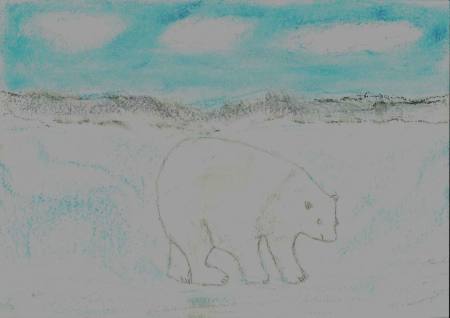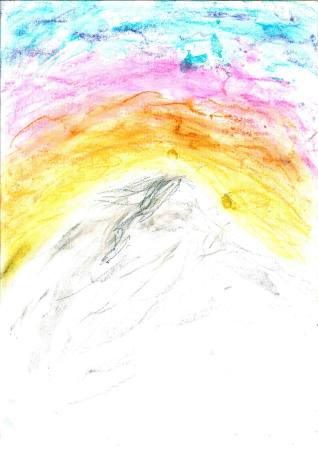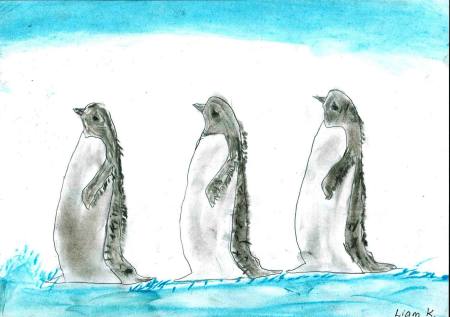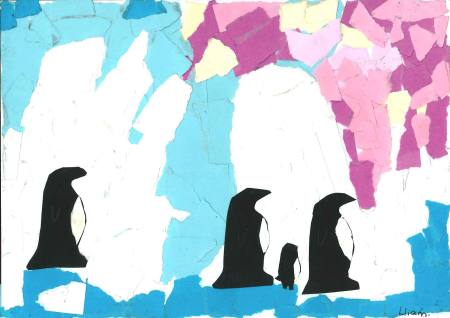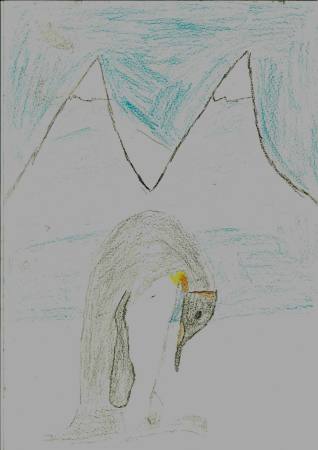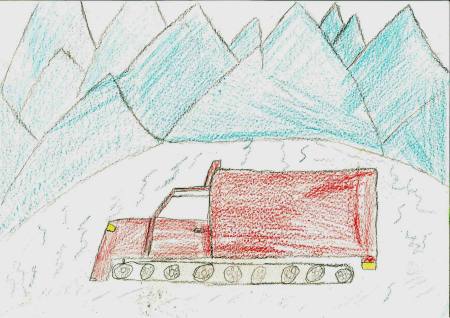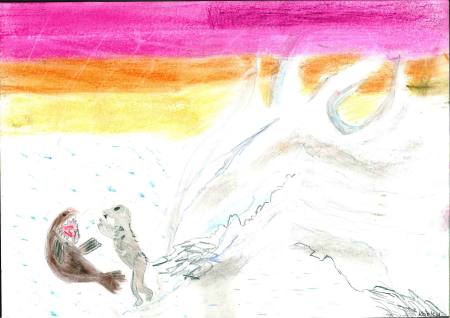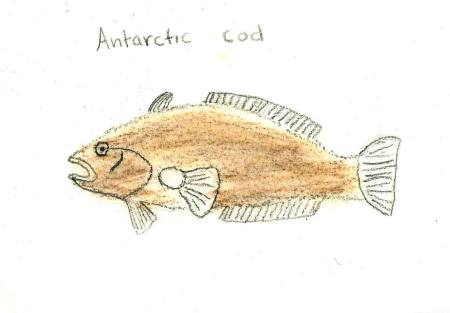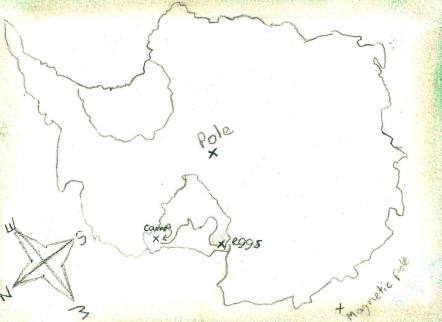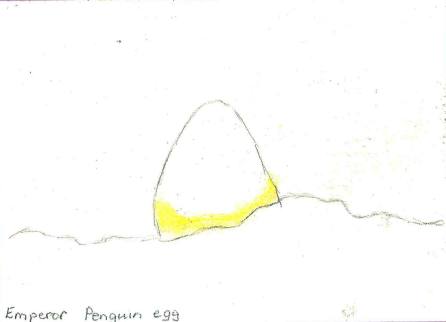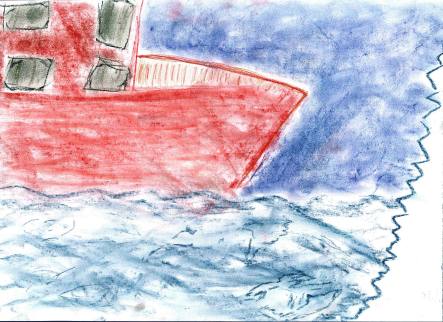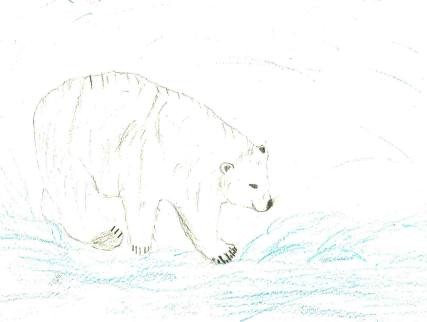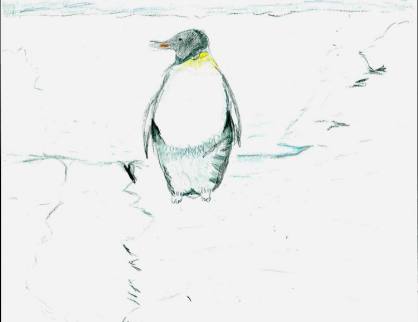Group 6
Ke’yush
A story written and illustrated by pupils in Grade 4/5 H at Deloraine Primary School, Tasmania, Australia and Grade 3D at Badger Road Primary School, North Pole, Alaska U.S.A. 2008
Chapter1: Departure
On a lonely street in Rosetta, (a suburb of Hobart) in an old house, lived a child named James Benjamin. He lived with his parents. His father was an Antarctic scientist and had been to Antarctica many times. His mother was a chef and she owned a local restaurant. James had a friend named Louisa Lola (Lisa for short). James went to the same school as Lisa and they had been friends for five years. Lisa’s father is also an Antarctic scientist and he was friends with James’ dad.
One day James invited Lisa to come over after school. At three o’clock Lisa and James were walking home past the restaurant that his mum owned when she came out and told them to go home because James’ dad had a huge surprise for them. They walked home talking and wondering what the surprise could be.
When they reached the front gate they ran all the way inside to the lounge room, where Mr. Benjamin was standing in front of the fireplace. He turned around beaming at them and told them to sit down. At that moment they saw a twinkle in his eye.
‘Has your mother told you that I have a surprise for you two?’ he asked.
‘Yes’, answered James and Lisa in synchronisation. ‘Can you please tell us dad please, please?’ asked James
‘Ok I’ll tell you’. You know how I’ve been very busy lately and I’ve been in my office a lot, well it’s all paid off. Next fortnight we are going to……….. Have a guess’.
‘Disneyland!’ guessed James
‘No. We are going to Antarctica and Lisa you are invited to come with your father to Antarctica with us!’ said his father with a grin on his face.
‘Wow! Are we really going to Antarctica?’ asked the kids happily.
‘Yes, we are going on a boat called the Sea Questor.’
‘Hello’, said James’ Mum who had just walked in through the door.
‘Have you told them honey?’
‘Yes dear’ replied James’ father.
‘We are going to start packing tomorrow and I hope you kids know what the weather is like down there!’ said Mrs. Benjamin in excitement.
That night both the kids had dreams about how wonderful their trip would be.
A fortnight later….
The day came for the huge trip to Antarctica. James and Lisa were so excited that they were up at six o’clock! They had to help get all the big boxes on board the Sea Questor. Once all their things were on board they were ready to set out on the long trip to Antarctica. It would take several weeks.
The captain showed James and Lisa around the boat. The rooms were small but they would do. Although the boat was large it was crammed full of machinery, cargo, supplies and even a helicopter.
As the boat sailed down the Derwent River the water was calm. But when they were four days out to sea it started to get rough. The wind began to howl. The waves became larger and the boat began to rock. The air became colder.
It was hard to get to sleep because of the waves crashing against the boat. James felt sea sick. He started to spew. Lisa ran out of the room very quickly at that moment.
James was sick for five days. Lisa felt sorry for him and went to visit him everyday. She felt fortunate to not have been sea sick yet.
After a fortnight on the boat they started to see ice in the water. ‘This is amazing,’ said Lisa.
‘It really is amazing,’ said James.
The ice made a shushing sound against the side of the boat. A couple of days later the children noticed pancake ice and then they saw their first iceberg and standing on top of it was a group of penguins.
Lisa was fascinated and stood open mouthed at the rail watching them while James ran around madly snapping photographs with the new digital camera he had bought especially for the trip.
That night James woke suddenly. At first he lay there wondering what had happened. Then the boat suddenly came to a shuddering halt. Noisily the motors revved and the boat moved slowly backwards.
James jumped out of bed and struggled into warm clothing and rushed out to the railing to see what was going on. In a few moments he was joined by Lisa who had thrown her clothes on over her pyjamas.
‘What is happening?’ she asked eagerly.
‘I don’t know,’ James replied briefly while trying to peer along the length of the boat to see what was happening at the front.
Just then they were joined by their parents.
‘We have finally reached the pack ice and we are going to have to force our way through,’ explained Mr. Lola.
The children watched fascinated as the huge boat with spot lights blazing moved forward again at full speed. They were jolted off their feet as the boat crashed into the solid ice and caused a split to appear ahead of them. The boat slowly inched its way into the crack until it could go no further and then the whole process of backing up and ramming the ice was repeated again.
Slowly they moved forward in this way for the next two days. Finally the captain announced that they could no longer move forward and they would be unloading supplies and mail for Casey base.
The children were fascinated by the unloading. The huge cranes on the boat swung into action lifting cargo and machinery over the side of the boat and depositing them on the ice.
Suddenly a whole line of all terrain vehicles slowly emerged from the mist and sped towards them. These were the men and women from Casey Base who had come to collect their supplies. Mr. Benjamin explained that these people had been wintering over at the base and this was their first chance to receive fresh supplies and mail from home.
After some time spent talking to expeditioners the boat was ready to slowly back up and move off. The boat made its way slowly back out to the edge of the ice shelf and James and Lisa watched closely as their fathers began to prepare to conduct some of the scientific research that they had come to Antarctica to perform.
A few days later Lisa and James were reading while stretched out on the deck in the pale sunshine when Lisa suddenly said, “Let’s go for a walk around the deck.
‘I’ll race you,’ called James running off. They chased each other around the deck for ten minutes before stopping to catch their breath.
At that moment they looked over the side railing and witnessed………..
Chapter 2
The children looked over the boat railing and saw a polar bear and a leopard seal battling. They were floating in the choppy cold water. The children were amazed! How could a polar bear have gotten this far south?
The polar bear began to attack the seal and the seal fell in the cold waves of the ocean. The polar bear dropped down on his haunches to rest. How did he get here? This place was different than home. He was a little scared and worried. He layed down and tried to remember what got him here.
He remembered playing with his brother on the ice while his mother looked for food for the family. While the polar bear brothers played on the ice they didn’t pay attention to where they were going. The two polar bear siblings fell through a thin part of the Arctic Ice.
The ice had begun to thin as the years had passed. Mother bear knew it had been different (global warming) but the brothers only knew of small ice bergs and thin ice. As the brothers tried to get out of the water, a slimy substance covered their bodies. It was hard for them to get out of the water. They swam back under the water and again tried to come up to get out. As they swam farther and farther trying to get onto ice, they couldn’t shake the slimy oily substance from their fur.
Petroleum exploration, extraction, transport, and processing in the Arctic affects polar bears and their habitat in many ways. There are already large installations and operations in the Arctic and the oil and gas business is set to expand in the years ahead.
There is one true offshore oil production installation in the Arctic, in the Alaskan Beaufort Sea. Onshore arctic oil installations are currently found in Russia, Canada, and Alaska. Oil and oil products pose serious health risks to polar bears. Contact with oil spills reduce the insulating effect of bears’ fur. The direct effect is that the bear must use more energy to keep warm, and must compensate for this energy loss by increasing its caloric intake, which may be difficult. Given that polar bears have very limited access to food for long periods of time, such an increased demand for food may result in starvation. Polar bears can also ingest oil through grooming and through scavenging and preying on contaminated seals, seabirds, and other prey The ingested oil can, for example, cause liver and kidney damage, and has long-term toxicity. Even a limited amount of oil on the fur of a polar bear can kill it, primarily by poisoning through grooming.
Finally, tired and worn out the polar bear brothers came upon a rocky shore. They drug? themselves on the rough coast to rest. (polar bear tracker) http://www.panda.org/about_wwf/where_we_work/europe/what_we_do/arctic/polar_bear/index.cfm
Chapter 3: The Fight
It was a leopard seal and a polar bear fighting. The polar bear was winning. There was blood everywhere; you couldn’t really see the ice. The kids ran straight away to where their parents were on the deck, talking about how long it would take to get to the South Pole from their present position.
‘Mum, dad, we saw a polar bear,’ James yelled.
‘As if..! There are no polar bears down here’
‘Come and look,’ said James.
‘Where is it?’ asked Mr Lola.
‘Next to the ship’, said Lisa.
Mr Benjamin went to the side of the ship. ‘That’s silly kids, complete rubbish,’ replied Mr Benjamin.
‘Wow!’ he said as he saw the bear, ‘It really is a polar bear’.
‘That is weird’ said Mrs Benjamin.
‘I know, and there are meant to be no Polar bears in Antarctica’.
‘I wonder how it got here?’ asked James.
Just then the captain of the Sea Questor gave a shout and began pointing to the starboard side of the ship. The children followed the direction of his outstretched hand and saw a man in a small black rubber dinghy being tossed up and down by the huge swell that was being whipped up by the winds.
Whenever the boat bobbed up on the top of the next wave the man would shout and frantically move his hands about before disappearing down into the next trough.
Suddenly the polar bear swam over to the dinghy and started attacking it.
‘Oh no it’s attacking that boat over there’, shouted Lisa with a scared voice.
‘We should help’ said James
‘No it’s too dangerous,’ replied Mr Lola.
‘We can’t get the Sea Questor close enough,’ said the captain. ‘But we can try with the rubber ducky.’
‘It might be our only chance,’ said Mr Benjamin.
‘Ok!’ said Mr Lola. ‘Let’s try.’
The crew quickly launched the rubber dinghy and the two men climbed on board and started the outboard motor. While James, Lisa and the crew held their breath the two men battled the waves and moved ever closer to the man who was by now clinging desperately to the remains of his boat. The polar bear was nowhere to be seen.
They made a grab for the man and missed. They went in for a second shot and succeeded. They grabbed him and pulled him onto their boat.
‘Where has that polar bear come from?’ asked Mr Benjamin.
‘It’s a long story. Thank you for saving me’ answered the man. ‘By the way my name is Robert.’
The crew of the Sea Questor helped the three men on board and led them away to have a hot shower and put on dry clothes. The children hopped from foot to foot waiting impatiently for the adults to reappear. They scanned the sea and the nearby ice looking for the polar bear but they couldn’t see it anywhere.
At last the adults returned carrying steaming mugs of hot tea and Robert began to tell his tale.
I was a crew member on board the ……………sailing from Vancouver to Antarctica. When we had been at sea for several days one of the crew spotted a polar bear in the ocean. The poor thing was a long way from land and a long way from its natural habitat. It was obviously exhausted and was in danger of drowning.
We hauled it on board and found that it was only a cub. We named it K’eyush which means cub in the Inuit language. We spent a lot of time fishing to get food for him and to nurse him back to health.
We were not sure exactly what we were going to do with him. But he would be more at home in Antarctica than sailing around on a boat.’
Robert paused for breath and the children began to ask lots of questions, both talking at once.
‘Just a minute,’ their father’s cried, ‘Let Robert finish his story.’
After a few moments Robert continued. ‘As we neared the ice shelf K’eyush jumped overboard and scrambled on to the ice. Just at that moment everyone was watching the bear and the boat hit an ice berg and it split open the side of the boat, letting the water rush in. I scrambled into the life raft and the waves swept me away from the sinking wreckage. I don’t know what happened to everyone else.’
The captain immediately ordered a change of course and the Sea Questor raced off to search for other survivors. James and Lisa joined the adults lining the rails and scanning the sea for any signs of life. The little polar bear called K’eyush was pushed to the back of their minds.
The captain radioed for help and the boat was soon joined by a helicopter from the nearby Casey Station. After what seemed a long time they began to see wreckage from the stricken ship.
Suddenly James let out a shout. ‘Hey what’s that in the water, Dad’
‘Oh no! It’s an oil spill!!!!’
Chapter 4 - Another Rescue
The oil spill was very large and spreading as the waves took it further and further. Where were the other people from the ship? Where was the polar bear? Lisa and James were worried about both.
“Dad!!!”
“What if the people from the ship are in the oil? What if the polar bear is?”
James and Lisa didn’t even want to imagine the effect oil would have on either one.
They searched the water for what seemed like hours. Suddenly they saw something that seemed out of place. ”A man! A man!”
They saw the man bobbing in the oil slicked water. As they approached him in the small dinghy they saw the reason he had survived the cold water. He had on a cold water survival suit.
Further on they saw the polar bear, floating in the water. He needed to be rescued fast. His natural cold water survival suit could not survive the oil slicked water. His fur could not breathe and he would sink and die.
As they pulled closer they worked as a team to get the exhausted K’eyush into the boat. Even though he was a cub he weighed over twenty pounds. So everyone helped and they pulled him into the boat and took him back to the research ship. He needed to be washed off so his fur could breathe. There was no time to waste for him or the man.
Chapter 5: The Surprise
Once K’eyush was on board he needed to be cleaned up. He was exhausted from swimming in the water and oil. James and Lisa’s job was going to be fairly easy.
It was time to get started so James got the hose to thoroughly wash and rinse Ke’yush down. Lisa meantime collected some detergent from the laundry and poured a generous dollop over the bear’s body. The washing began.
After a while James let out a huge sigh. “Getting oil out of fur is really hard work!” he exclaimed.
“You can say that again,” said Lisa.
Out of the blue James had an idea. “Hey, we could use a brush.” He cried. He rushed away to collect one from the purser. The brush made the job much easier and James and Lisa were having a much better time. Ke’yush was half done. But she still needed a lot more work.
James got a bucket and rinsed K’eyush down. This woke him up a bit and he broke away and went running around the deck. The children ran after him and it took a long while to catch him. James and Lisa were getting tired of all the grooming so they tied Ke’yush up and went down to the galley to get something to eat and drink.
When they returned the adults were still not about. They were having a meeting and trying to decide what to do with Charlie, the man that had been pulled from the oily sea. He was very ill. “I hope he will be all right,” said Lisa. They got back to work and before they knew it, they were done, finished and Ke’yush was squeaky clean again.
Lisa said, “Ke’yush is hungry again so we had better go fishing. They collected the tackle from the locker and dropped the long lines over the back of the boat and waited. After about ten minutes Lisa felt the first bite but the fish escaped.
A minute later James felt a bite. He quickly pulled hard on the line until the fish was hooked and then wound it in slowly. When he saw the fish he was amazed.
“It’s a whopper!” he cried.
“I wonder what kind of fish it is?” asked Lisa.
A passing seaman told them it was an Antarctic cod. After an hour they had enough fish to keep Ke’yush happy for quite a while. So they woke the sleeping bear and fed him.
Finally they were free to go and have their own tea. They were both very tired but also very excited about the events of the day. That night they talked for ages before Mrs. Benjamin came to tell them that the man who had been pulled from the oily water would be lifted off the boat by helicopter in the morning. Then she chased them off to bed.
The next day the children were up bright and early to check on the polar bear.
“We will have to go fishing again,” said Lisa.
“Yes,” replied James but just then Mr. Benjamin called them and led them to a cabin on the starboard side of the ship.
“I want you to meet Charlie Andrews,” said Mr. Lola, “but be careful he is very ill. He needs to be flown back to Casey Base by helicopter and then airlifted by plane to Hobart. He wants to thank you for helping to rescue him.”
The man in the room was still dirty and oily. He was a tired man who could barely speak. He didn’t seem to know where he was. Two of the ship’s crew had carefully removed Charlie’s dirty oily suit and this was lying in the corner of the room. In a chair in the opposite corner the doctor was busy writing notes to be sent with Charlie to hospital.
Soon enough the helicopter arrived and Charlie was loaded on to it on a stretcher. James and Lisa watched the huge helicopter lift into the sky and slowly disappear to become a tiny black dot in the hazy blue sky.
It was sad to see Charlie go even though they didn’t know him very well. Robert had told them he was a hard worker and a loyal crew member.
Lisa and James decided to go fishing over the side of the Sea Questor. They needed to catch lots of fish to keep K’eyush in food. When they tired of this task they played games for a while before Mrs. Lola came and asked them to help clean up the cabin here Charlie had spent his short time on the boat.
When they went in to the cabin it seemed bare and empty. The oil stained linen was still on the bed and Charlie’s oily survival suit still lay crumbled on the floor in the corner. Lisa quickly stripped the bed and took the sheets to the laundry to be washed. When she returned James was busy placing the survival suit in plastic garbage bags to be taken back to port to be disposed of safely.
As Lisa bent to help him she noticed a small plastic bag protruding from a pocket. She carefully lifted it out and was pleased to see that the bag was sealed tightly and this had kept the contents dry during the time Charlie had spent in the water. She showed it to James.
“What do you think it is?” he asked.
“Shall we open it and see?” replied Lisa.
“I think we should because it might be something important,” answered James.
Carefully the two children opened the package and took out a single sheet of photocopied paper. They spread it on the bed and looked at it carefully. It was some kind of rough hand drawn map but the children could not figure out what it was about.
Chapter 6: The Map
“What have you got there kids?” asked Mr. Benjamin walking into the cabin.
“We think it is a treasure map but we are not sure,” answered James.
“We found it in Charlie’s survival suit,” added Lisa excitedly. “Do you think Mr. Shandell might know?”
“Let’s ask him,” replied Mr. Benjamin quietly.
They found Robert stretched out in a chair on the deck. He was sitting next to Ke’yush who was tied to the railing to stop him from jumping overboard again. Robert’s eyes were closed but his right hand was scratching the bear cub behind his ears so Lisa decided that he could not be asleep.
“Robert;” she whispered and when he opened his eyes and saw them he smiled and sat up.
“Hi, kids,” he answered in a sleepy voice.
Quickly, the children told him about the map and where they had found it. When they were finished he was quiet for a long time before he looked up with a sad smile on his face.
“Poor old Charlie,” he said and then he told them a long story about Robert Falcon Scott’s disastrous attempt to be the first to reach the South Pole. He went on to explain that before the party had set off on their quest that three members had ventured out in the middle of an Antarctic winter in search of an emperor penguin colony. They had succeeded in finding it and in collecting a number of emperor penguin eggs. When they returned to camp some of the eggs were packed ready to be taken back to the British museum. The rest had been stashed near the camp to be used in emergencies. The map showed where the eggs were stored.
But how did Charlie get the map?” asked James excitedly.
“Well you see Charlie and I are both scientists who are interested in penguins, particularly emperor penguins,” Robert continued. “After Scott’s party failed to return from their expedition the rest of the party packed up the camp and returned home. They took with them the eggs for the British museum and these along with a few other boxes of things were placed in a back room and simply forgotten about. One day Charlie was examining them when he came across the map. He wanted to travel to Antarctica to find the other eggs so that he could compare their survival against that of the ones in the museum. He asked me to come along and help him,” Robert added softly.
“Well, we rescued the bear in the middle of the North Atlantic Ocean and then when we arrived our boat collided with the ice berg and sunk. Now poor Charlie is too sick to finish his research and I am only a grateful visitor to your ship,” he finished sadly.
“What an incredible story,” Mr. Benjamin said.
“Dad, could we please follow the map and find the eggs for Charlie?” begged James.
“We can’t be sure they are still there,” said Mr. Benjamin shaking his head.
“But Charlie thought they might be, didn’t he?” said James turning to Robert eagerly.
“Well, he certainly thought it was worth a trip down here,” replied Robert.
“If we could find them it would mean that all his suffering would have been worth it,” added Lisa with a grin.
“Let me think about it,” replied Mr. Benjamin firmly. “After all we did promise to take you two ashore to spend a couple of nights on the ice, didn’t we?”
James and Lisa went up to the bridge to watch sunset. It only dipped just below the horizon before it started to come up again but the sky was a beautiful mass of colours and these were reflected in the icebergs that were slowly sliding past the side of the ship.
The next day they waited eagerly to see if Mr. Benjamin had made up his mind about their trip ashore onto the ice. At last he said slowly, “I have thought about our trip ashore. We will go but I can’t promise you we will be able to follow the map or find the eggs. They were left behind a long time ago and they have probably been found and eaten by skuas long before now.”
“But if we go near the place marked on the map we can have a look can’t we?” asked the children wriggling with excitement.
“I suppose so,” replied Mr. Lola reluctantly. “Now go and help sort and pack our gear for a couple of days on shore. Mr. Benjamin and I have some important arrangements to make as the trip can be very dangerous if you are not prepared. We leave at 5 a.m. in the morning.”
“Thank you,” they chorused.
The rest of the day consisted mainly of packing or the trip.
“We’ll need plenty of food, tents, ropes, a small generator, snow shoes, a compass and fuel,” James said.
“Don’t forget the map and plenty of chocolate,” added Lisa. “This will be so much fun.”
Chapter 7: Adventures on the Ice
The children arose early the next morning to see that the vehicles their parents had requested from Casey Base had arrived. They help stow all their gear and when they were ready they set off across the white wilderness. Robert was navigating by a compass and the children couldn’t wait until they reached the area contained in Charlie’s map.
After about two hours of slowly making their way forward at what seemed like a snail’s pace they discovered that K’eyush was following them. He was trotting along behind with a steady pace, sniffing the air as he went. When he finally tired they put him in the hagland with some of their supplies.
“I hope he doesn’t eat all our chocolate?” said Lisa.
“Don’t be silly, he only likes seals and fish,” replied James
After a while the temperature began to drop as the sun skimmed the horizon so they decided to set up camp. The adults insisted that the children were not to venture outside the tents on heir own as it was too dangerous and there was always a chance that they could become lost in a whiteout.
“What’s a whiteout?” asked Lisa.
“It is when the wind picks up the snow and swirls it around and you can’t see more than a metre in front of you,” replied Mr. Lola. “It’s sort of like a heavy fog except that it’s caused by snow and not moisture.”
The next morning the children awoke to a large cracking sound followed by a scream. They rushed outside to see a huge crevasse that had opened up suddenly and Robert was dangling over the edge hanging on by his fingertips. He had lost one of his gloves and his warm fingers were stuck fast to the ice.
“Don’t come too close,” he yelled. “The ground just opened up under my feet.”
The adults quickly got some ropes and hauled Robert to safety and bandaged his badly skinned and frozen fingers. James and Lisa were shaken by the accident and decided to stay close to the adults. The crevasse was very deep and Robert explained that it had been covered by a snow bridge so he had not noticed it but when he had trodden on it the snow gave away and he had fallen.
They decided to stay in camp that day so they could look after Robert’s snow bitten fingers. Mr. Benjamin explained that he might need to have them amputated when he returned home.
During the night a howling wind arose and a blizzard set in. It raged for three days and nights. They were all confined to their tents as it was impossible to stand up outside, the wind was blowing so hard and the snow was swirling around thickly.
On the fourth morning the children awoke to the sound of silence. The wind had dropped and the snow had settled again. The children had to dig their way out of the tent as the snow had piled up against the door. K’eyush had slept most of the time and the children were worried that he was sick but Robert explained that he was probably just confused because back in his homeland of Alaska it would be winter and time for him to be hibernating. So they put him in the hagland and left him to sleep.
“At least he is not hungry all the time,” said Lisa thankfully.
They packed up the camp, stowed all their gear and set off once more following some invisible path. They passed a huge sustrugi and Mr. Benjamin explained that they were formed wherever there is unevenness in the snow. They are like sand dunes only made of snow that has been piled up by the wind. They can be so soft that even a man can sink into them or so hard that they can rip the undercarriage from a plane or helicopter attempting to land on them.
They had to move carefully in that area with the adults going first and testing the ground at every step to see if it would hold their weight. Once they got the hagland and its trailer bogged and had to dig it out. After what seemed a lifetime they started to recognise some of the shapes marked on Charlie’s map. They made camp once more.
The next morning the children ran around madly digging holes looking for the eggs. They soon tired of this and they decided that they were never going to find them. The adults laughed at them and sat down and carefully made some calculations and set out once again to start digging. But at last even they gave up scratching their heads.
“I told you,” said Mr. Benjamin tiredly. “It was useless trying to find them after all this time. We will need to return to the ship tomorrow.”
That night the children went sadly to bed feeling they had failed in their mission to find the eggs for Charlie.
“Don’t worry,” Robert told them, “You have saved Charlie, K’eyush and me and you have tried hard to make Charlie’s dreams come true.”
The next morning they were busy packing up when Lisa noticed K’eyush nosing around near one of the holes they had dug. Suddenly she started scratching furiously at the snow. The children went to investigate and found a broken egg. James quickly pulled the bear away while Lisa carefully scraped the snow away. She let out a cry of surprise and held up a large egg. It had a pointed top and a round base that was yellow.
The adults came running to see what they had found. Robert took the egg carefully in his bandaged hands. “It’s definitely an Emperor penguin egg,” he exclaimed. Although they dug carefully around in the snow they only found broken shells. They had discovered the only complete egg to survive.
“Awesome,” said Mr. Benjamin, “now we only have to get it back to the boat.”
They packed it carefully and set out on the return journey. The weather was good and they made good time by following the markers they had left in the snow to mark the track. The only incident was when a large leopard seal reared up out of a crack in the pack ice and tried to grab Mr. Lola as he stepped over the crack. K’eyush quickly grabbed the seal and dragged it out of the water. He killed it and began to devour it.
“It tastes better to him than all that fish you have been feeding him,” laughed Robert. When they reached the boat they had a wonderful tale to tell the captain over their tea.
Chapter 8: Home at Last
On the way back from Antarctica it was rough and both the children suffered seasickness. It was hard to keep up with the demand of K’eyush’s eating habits.
The children were excited about the egg and they began to wonder if modern science could unfreeze the egg and bring the chick inside back to life. James decided to ask his dad if it was possible.
“Dad do you think that one day the penguin egg could hatch?”
“Maybe son, but I don’t think so,” he replied.
“Well I believe it will,” said James wistfully.
The next day was hard. James and Lisa had no luck caching fish so they had to let K’eyush go without food.
After a long journey they finally reached Hobart. The children were glad to be back on dry land. They couldn’t wait to visit Charlie and tell him about the egg and their adventures.
The parents decided to talk to the children about what to do with K’eyush. James suggested they should send him to a zoo.
“That’s certainly an option,” replied Mr. Lola.
“We could send K’eyush to Sea World,” said Lisa.
“Oh! What a great idea,” said Mr. Benjamin, “I’ll make some enquires.”
K’eyush was sent to Sea World and a couple of months later the children received a letter to say that he had settled in well and was in tremendous condition and none the worst for his extraordinary adventures.
Robert Shandell and Charlie Andrews returned home to their relieved families. They returned to the university and continued with their research. But they both vowed never to venture to Antarctica again.
When the children returned to school they bragged about their adventures. The other children thought they were lucky not having to go to school for two whole months. The teacher suggested that they should do a project to share with the rest of the school.
“We already have,” said Lisa. “We have kept a diary, made a power point presentation and a movie.”
As they were walking home that night they talked about how good it was to be back in Hobart.
“But I do miss being on the boat,” said James.
“I miss K’eyush,” replied Lisa, “But not the cold.”
The End
Ke’yush is an Inuit word meaning bear cub.
Dedication
We would like to thank all the people who made this story possible. In particular we are most grateful to Mr. Andy Baird of the Tasmanian Museum and Art Gallery for allowing us to be part of the Ice E Mystery project and for making our time at the Island to Ice exhibition so informative and enjoyable.
We also wish to thank most sincerely Mr. Joel Pedro of the University of Tasmania, for allowing us to share his Antarctic Adventures, the wonderful science experiments and the numerous emails from his latest visit to the frozen continent.
Deloraine Primary School 2008 Class 4/5H
Samuel Alderson
Karley Beer
Rye Bissett – Proudfoot
Megan Bott
Nathan Claridge
Liam Donohue
Milion Donovan
Lliam Drury
Emily Eastley
Matthew Griffen
Danieka How
Tara Howe
Liam Kearns
Cameron Marett
Patrick O’Shea
Corey Parker
Brooke Robertson
Declan Schnoor
Holly Scott
Sophie Squires
Emma Taylor
Joel Taylor
